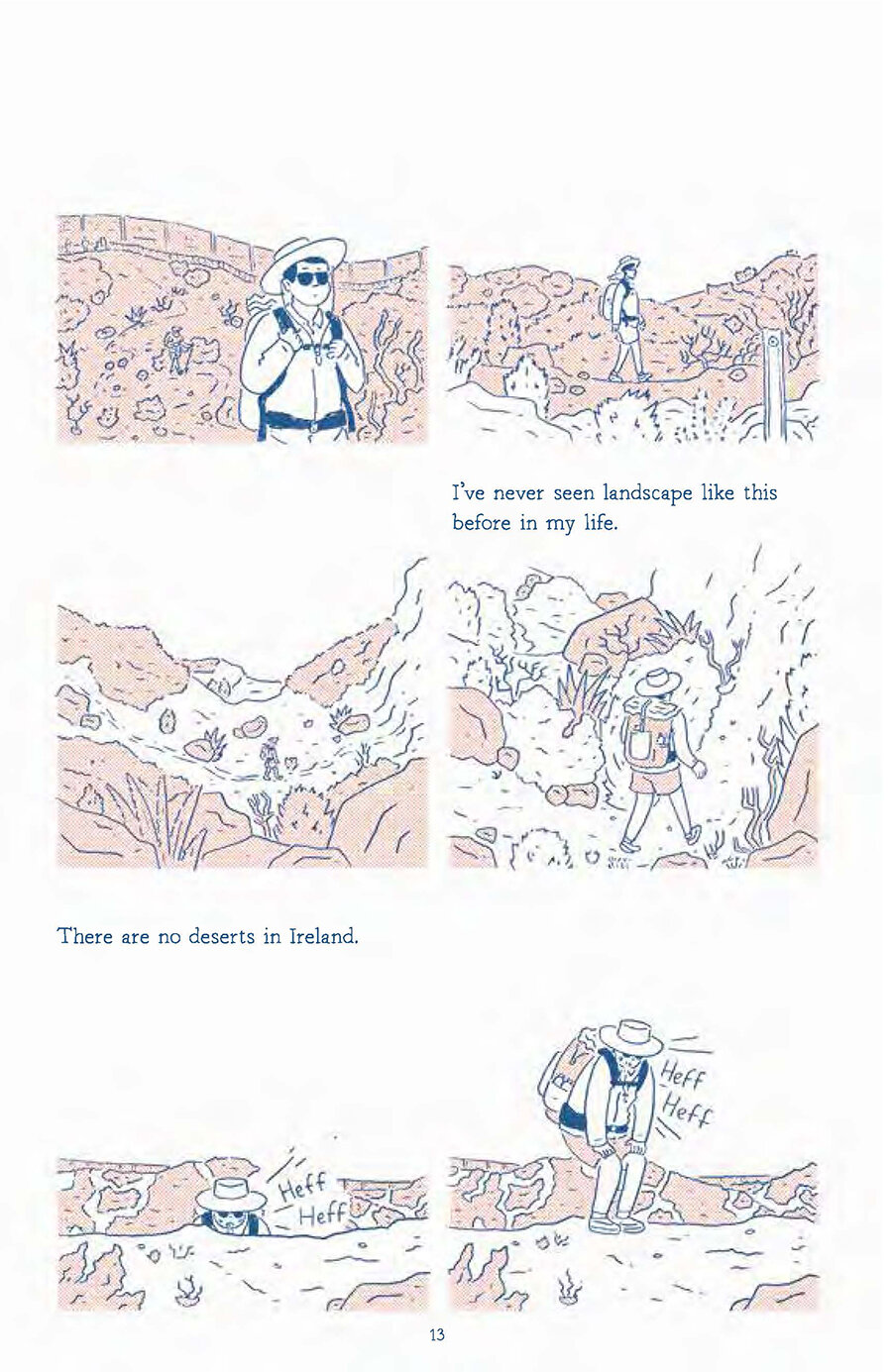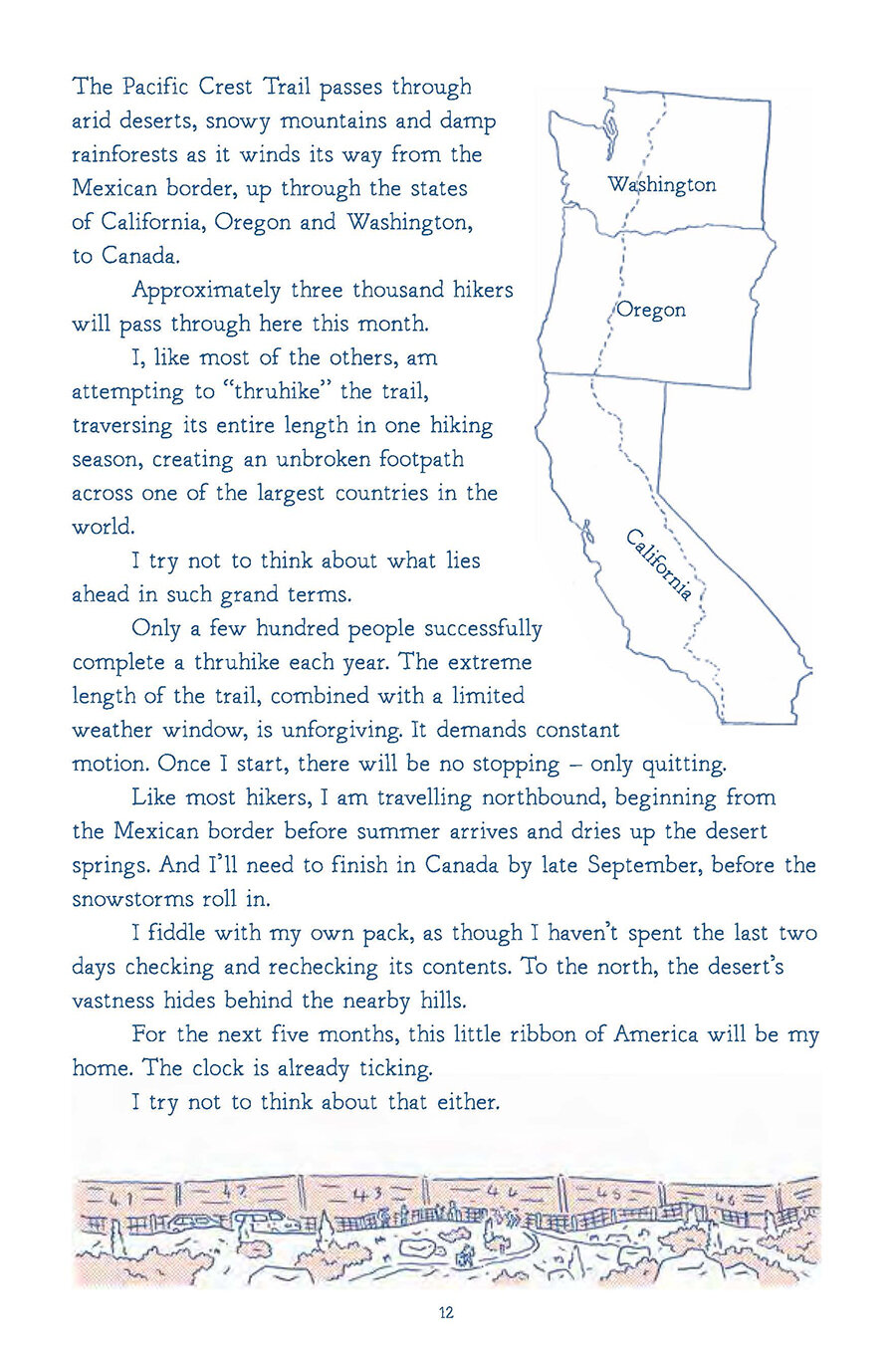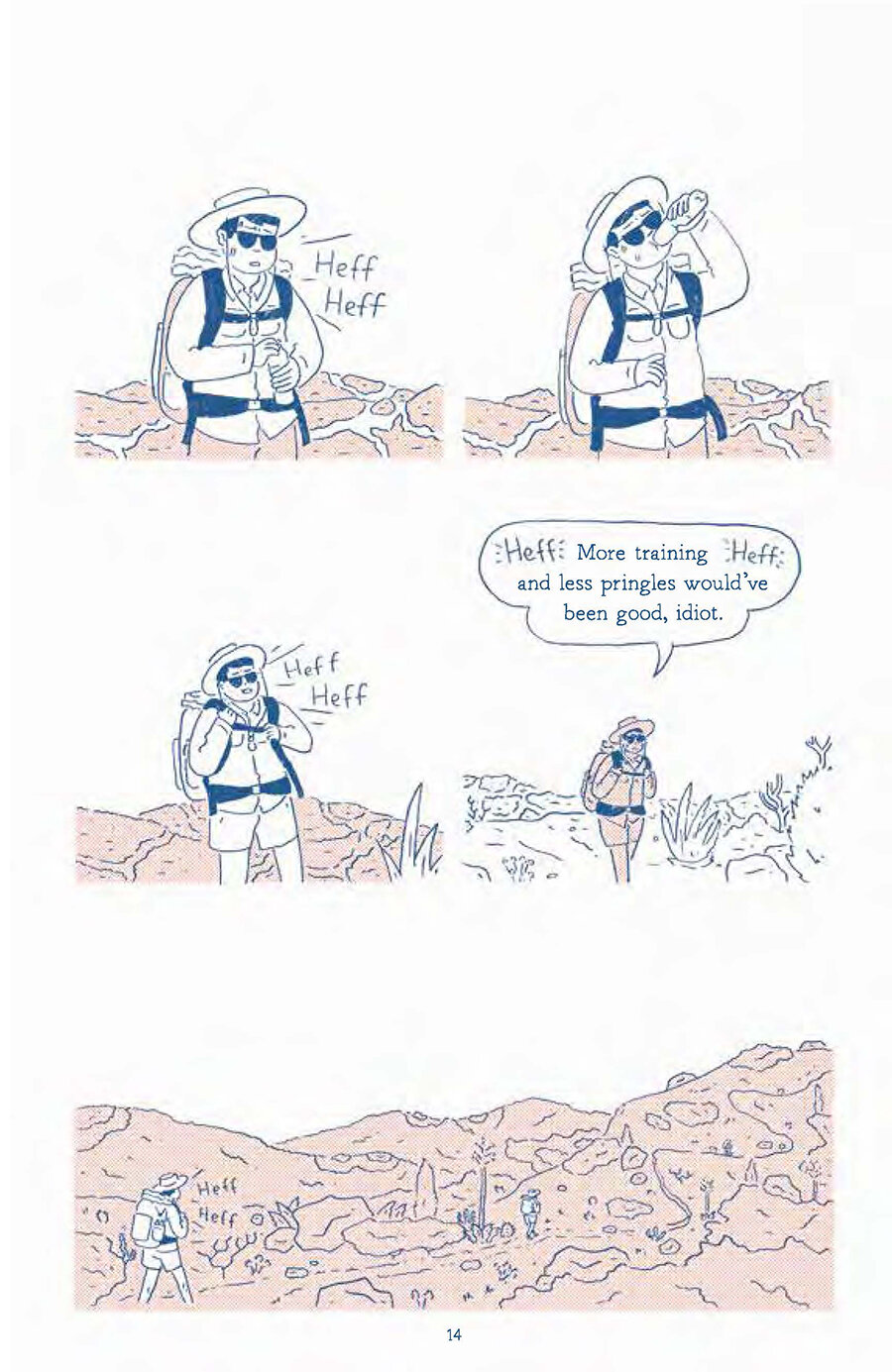True Americana: Illustrations of the Pacific Crest Trail

Americana (And the Act of Getting Over It) is a graphic novel that chronicles Luke Healy's journey as an Irish immigrant immersed in a uniquely American experience - hiking the Pacific Crest Trail (PCT). Healy's adventure of the PCT, admittedly, was inspired by Wild by Cheryl Strayed. Similar to the story of Wild, Healy's perspective is one of a newcomer learning the hard lessons from the trail - overpacking, fatigue, isolation, and all that comes with attempting a thru-hike. The book avoids the lengthly reading required of major hiking novels - A Walk in the Woods, Becoming Odyssa, Wild, etc. Instead, the novel includes pages of whimsical graphics, all drawn by Healy, followed by sections of extended writings capturing the character Luke’s more personal thoughts, ideals, and reflections.
Americana is more than a simple trip report as Healy's writing frames the work with more depth. Largely a memoir, the story includes plot themes of coming-of-age, the immigrant perspective, and an American experiential account. Underlying these themes in Americana is Luke recording his observations on the trail through his use of sincerity, charisma, and at several occurrences - humor (Heff, Heff, Heff). Side note: Luke is currently a working comedian in London. Through his use of humor, Healy manages to engage the subtleties of bolder social-political issues intertwined with an impactful outlook of authentic American life; the good, the bad, and the Heff.
For the coloring, Healy arranged a minimal palette choice of using only red, white, and blue - a patriotic reference to America. However, instead of using bold, striking colors to represent the US (think of the national flag), Healy's color hues seem a tad dull, faded, and pastel. That symbolism appears to be a subtle nod to Healy's rose-colored glasses as an Irish immigrant. Healy held an original concept of the US, on the surface, as a country of innovation and acceptance. However, underneath that surface, historical and cultural issues still plague. Unfortunate by-products sometimes witnessed in real life by Healy and his experience on the PCT.
As a disclaimer, I heavily related on several levels with Healy and the work - as I was an expat in the Netherlands for two years. I understood when Luke describes the fleeting moment of knowing your visa is about to expire, having to visit the embassy, being the cultural outsider, and at times - romanticizing about the place you're in.
With that, Healy isn't looking to Americanize or celebrate his Americanization. He's proud of his Irishness and defensive of his identity while on the trail. Neither Luke nor I are very patriotic, yet being the foreigner in another country does cause a moment of reflection into our own identities.
This ultimately helps with avoiding being the stereotypical caricature others may think of us while aboard. Thus, as Healy relays in Americana, he is merely an observer of the US; it's people, issues, and culture. Luke is an artist and writer, one who typically adds to cultural critiques of society through observation and creation. I think that is an important distinction to remember for the purist or gear-junkie when reading Americana. If you find yourself falling into those categories, you may find issue with some of Healy's perspective of his PCT experience. For a section in the story, Luke does go off the trail. He also does not dwell intensely on the gear he hiked with. Luke's mentality is that there are no real rules on the trail - just go, hike, and enjoy. He is politely unbashful for his trail mentality, which I think adds to his sincerity of being the American outsider. It presents a new, fresh perspective that comes out of an easy-going attitude and reflective lens on issues America at-large still struggles with.
Join Luke on this must-read whimsical memoir into being the outsider immersed in American life. Americana (And the Act of Getting Over It) is a much-needed break from the typical hiker reads, gear-lists, and trail maps. It's a highly reflective, multi-layered story featuring gorgeous illustrations, tasteful humor, and a colorful cast of characters. It’s a highly recommended novel to nature lovers and comic nerds alike.
Luke Healy, Author Q&A
Ams: Do you go by the trail name Bivvy or Luke and how did you get the name Bivvy?
Luke (L): You can read about it in the story, but I couldn’t set up my tent and it was such a disaster. It’s been a long time since anyone called me Bivvy. The only people who still call me that are other PCT hikers.
Ams: Did you go to school for cartooning?
L: I went to the Center for Cartoon Studies, which sounds fake but is real. It’s a two year Masters in Cartooning. It’s a real intense cartooning school in a tiny town in Vermont, about 1000 people live there. The program is around 10-12 students for each class. Although I got kicked out a couple of times, as is mentioned in the book, I really liked it there! I am going back in two weeks to do a guest lecture.
Ams: Will you be talking about the book during your lecture?
L: Yeah, I am headed back to the US for an unofficial book tour. This includes visiting New York, Chicago, and Vermont, just stopping in to these places to give talks and do book signings.
Ams: The color palette in the book is gorgeous. Why did you decide to go with those colors?
L: Originally, I planned the book to be in B&W, but closer to publishing, my editor wanted it to be in color. The reason I chose those colors is because it’s red, white, and blue (Hence, “Americana”). It came out as a more white, dull pink, and a navy blue. When I told my editor to go with red, white, and blue, it was sort of a joke. I emailed him and said, “It’s about America!”. To my surprise, he emailed me back and said it looks quite lovely.
Ams: With the text in the book, it reads like a half novel, half comic. I am curious why you went with the hybrid of the two. With the novel side, the reader dives deep into the words and observations you have, and with the comic side, it feels more minimal. I think there were about six pages of comic where I just read, “heff, heff, heff.”
L: (Laughs) That is very likely. So something I am interested in is the craft of making. I come from the comic side more so than prose (extended narrative), so I am intrigued by the efficiency of storytelling. Comics are good at conveying storytelling imagery, along with emotions, actions, and dialogue conversations. The prose is an excellent way to communicate in-depth stories, ideas, abstracts, or internal thoughts. For example, it is a complicated idea to explain the PCT. In prose, I can do that on a page, but if I were to convey that with comics and text, it would be like 20 pages. Half of the book is for the pursuit of efficient storytelling; the other is I wanted the work to be reminiscent of a travel paperback. I want to have those prose sections, so it sets off someone’s brain that the book reads like a memoir.
Ams: Why did you feel the need to create this?
L: So when I was hiking, I didn’t think I would write something. I didn’t take any notes or any pictures. When I got home is when I knew I wanted to write about my experience. I hope this doesn’t make me sound like a narcissist, but so much exciting stuff happened on the hike - I felt it would be a waste not to write about it. I just had to tell people everything I just experienced; it was all so unique and alien.
Ams: Were you illustrating while you were hiking?
L: No, nothing. I was too tired for anything!
Ams: You mentioned in the book, the movie Wild somewhat inspired you?
L: Yeah, I watched the trailer for Wild, and that’s how I learned about the PCT. I became obsessed with it after that. For the previous year, I was writing my first book, just sitting at a desk, and I knew I had to get outside. Once I learned about the PCT, I thought, “yes, this is it. I have to do that!”
Ams: I am curious to what drew you to American culture and life. Is there more than just being bombarded by 90's American cartoons when you were young?
L: That was a big part of it. When I was a teenager, I lived on what was called a "Ghost Estate." It's an Irish phenomenon. There was a housing boom in the '90s, and they built all these housing estates in the middle of nowhere. Then the global financial crisis happened and nobody moved into them. There were about 150 houses built on the estate, but only my family and another family lived in them. We didn't have TV or internet, so I'd have to go to a friend’s house to watch TV, and a lot of what we got was American media (cartoons, news, etc). That's what started it all.
Ams: What about your Irish identity went into the work?
L: It's interesting, I speak with an American accident and I am a white guy. People we're always surprised when I told them I am Irish. I'm entirely an Irish immigrant, but I wasn't getting the immigrant treatment in America. I could pass as an American, and I wonder if that would have been different if I had looked different. I tried to convey that individual experience subtly in the context of America's broader social issues in the book.
Ams: Is there a lesson learned from that or how did that alter your perspective on the US, if at all?
L: Intellectually, I knew about all of America’s issues from news and media, but to see it first hand is a lot more striking. I’ve experienced a fair degree of homophobia before, but never witnessed racism before until I moved to America. You can read To Kill A Mockingbird in an all white classroom in Ireland, but seeing someone be a victim of discrimation is a lot different. I remember a time when I was with my American friends, one is a Latino guy. Our car got pulled over and only he got asked to show ID. I remember sitting there thinking, “I’m the immigrant”, “Why aren’t you checking my passport”, I was the only one who is not American in this car and yet I wasn’t getting asked for my ID.
Ams: In the book, you mention how taken back you were after seeing border patrol - were there any other social/political situations that stuck out to you while on the trail?
L: For sure, two things; one is the big contrast between the CA/Mexico border compared to the WA/Canada border. In the north, it’s just clear cut trees, and you can walk right through. No one was there to check my documents. I walked into Canada by accident and simply thought, “Oh, I’m in Canada now, wow.”
The other thing and something I wasn’t expecting, maybe naively, is that there is a fair deal of machismo on the trail. Though there were a lot of women out there thru-hiking, the culture felt that it had a very masculine bravado that most of the time was relatively inconsequential. It did occasionally manifest in sometimes uncomfortable or homophobic vibes.
Overall though, I find the community of PCT hikers exceptionally welcoming. Even in the small towns it was very welcoming, but again, I wonder how much of that is from my “passing privilege.” I’d be curious to talk to someone that didn’t have that about their experience on a mostly all-white trail. For the book, I think it is a little political, but it’s very quietly political - in that it doesn’t make any bold points. I just wanted it to read like a record of things I observed, thoughts, and processing.
Ams: In what other ways do you conceptually see the work?
L: Yeah, I think it's initially minimal because that's typically how I prefer to write. It's nonfiction, which I am a stickler for. Since it's nonfiction, I want it to be close to observational and be a recording of actual events.
The book tries to be impartial from my emotions. There's a lot of sequences that the Luke character is just standing still and observing the world around him. I wanted to do that to avoid inserting too much of my feelings.
Ams: What was the most challenging aspect of creating the book?
L: I think the hardest thing was choosing what not to include. The original pitch was 800 pages! I would still be drawing it!
Ams: Is there any story you'd want to tell that you had to cut?
L: It was hard cutting stuff and include only events I felt that were significant and not distracting. People were the hardest thing to cut. My interactions and relationships with people were hard to cut when they didn't build onto the character development in the story. There are people I love, respect, and still in contact with, but there just wasn't space for them. At the end of the day, the book had to form a narrative.
I hiked with this guy for awhile whose trail name was Van Gogh. He did beautiful paintings. He was hard to cut because I spent a reasonable amount of time with him, but there wasn't space.
In terms of events, there are some subtle things. I remember getting into a lodge at the border of California and Oregon, and this lodge was serving spaghetti and meatballs for the hikers. There was this woman who looked so relieved about eating a good meal. We made eye contact and just started cackling with laughter. We were so excited about something like spaghetti. I love that but had to cut it too.
Ams: It’s interesting how mundane thru-hiking can be that spaghetti can be the thing that makes your day.
L: A bowl of spaghetti can change your life!
Ams: In the book, what's a favorite moment of yours? Don't give away too much as I want people to read this!
L: Ohh, when I fell through the ice in the High Sierra and injured my leg. That's my favorite part.
Ams: How was hiking the Sierra with an injured leg?
L: It was a lot of trudging through snow. I found out later I broke my leg, which I didn’t realize until after I finished the trail. I had a fracture but just kept taking vitamin I (ibuprofen) to get me through.
Ams: OE is big on trying to inspire others. If someone wanted to get into illustrating with a focus on the outdoors - what advice would you give them?
L: In terms of advice, just push through it. The best suggestion I ever got was from a teacher at cartooning school, who said the only technique you need to master is how to sit your ass in a chair and work. Which is the most annoying thing to hear, but it’s true. You have to practice your patience and work ethic.
Ams: Plans on other trails in the states or are you just working in London for now?
L: Yeah, I am working and pitching new books here, but I moved here to become a stand-up comedian. It's a left turn, but I'd also like to get into hiking again. I want to hike this trail that goes from London to Rome, Via Francigena, with a little bit of a boat ride in the middle. If I did hike another trail, I think I would do the one in New Zealand - the Te Araroa, that looks cool.
Ams: Anything else you want to pitch or upcoming projects?
L: I am thinking about doing a children's book, other than that I want to focus on my comedy in London.
Ams: Where can people find the book now?
L: It's on Amazon. It's available in any good book shop in the states as Penguin Random House distributes it. Also, you can get it directly from my publisher on Nobrow.net.
Ams: Anything else you want to say to your adoring fans?
L: I am precisely as cool as I am in the book.
Click here to check out Americana (And the Act of Getting Over It) on Amazon.
More About Luke?
Instagram: Lukewhealy
Website: www.lukehealy.info/
DISCLAIMER: This article contains affiliate links! This means that if you click on one of the product links, Outdoor Evolution will receive a small commission at no extra cost to you. This helps keep the website up and evolving! Thank You!













